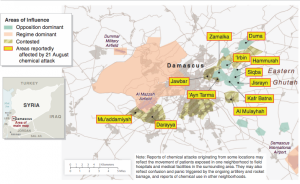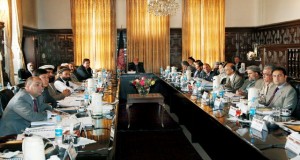Rush to Syrian War: What About US Relations With Iran and Russia?
Today’s New York Times opens its article on the effects a US attack on Syria would have on the efforts by the US to halt Iran’s development of nuclear technology by framing the question from the militaristic point of view that we must be “strong”:
As the Obama administration makes a case for punitive airstrikes on the Syrian government, its strongest card in the view of some supporters of a military response may be the need to send a message to another country: Iran. If the United States does not enforce its self-imposed “red line” on Syria’s use of chemical weapons, this thinking goes, Iran will smell weakness and press ahead more boldly in its quest for nuclear weapons.
And it is this need for the US to be tough (and for Obama to prove that he has a big d) that seems to be dominating virtually all of the media coverage of the push to get Congressional authorization for a strike. At least the Times does realize there is a very important flip side to that position, though, and that we may now be on the brink of more substantial talks with Iran than we have had in a long time. Here are the next few paragraphs:
But that message may be clashing with a simultaneous effort by American officials to explore dialogue with Iran’s moderate new president, Hassan Rouhani, in the latest expression of Washington’s long struggle to balance toughness with diplomacy in its relations with a longtime adversary.
Two recent diplomatic ventures have raised speculation about a possible back channel between Washington and Tehran. Last week, Jeffrey Feltman, a high State Department official in President Obama’s first term who is now a senior envoy at the United Nations, visited Iran to meet with the new foreign minister, Mohammad Javad Zarif, and discussed possible reactions to an American airstrike in Syria.
At the same time, the sultan of Oman, who has often served as an intermediary between the United States and Iran, was in Tehran meeting with Iran’s supreme leader, Ayatollah Ali Khamenei.
It is not lost on Iran that the AUMF for action in Syria is written broadly enough that US military action could spill over into Iran. A Fars News article dated yesterday cites the Jack Goldsmith analysis of the draft AUMF that foresees US action in Iran:
Goldsmith asked whether the proposed AUMF authorizes the President to use force against Iran or Lebanon’s Hezbollah, in Iran or Lebanon? Again, yes, if the President accuses Iran or Hezbollah of having a (mere) connection to the use of WMD in the Syrian civil war, and the use of force against Iran or Hezbollah would prevent or deter the use or proliferation of WMD within, or to and from, Syria, or protect the US or its allies (e.g. Israel) against the (mere) threat posed by those weapons. Again, it is very easy to imagine.
The article continues, noting (as Marcy has many times) how the 9/11 AUMF has been interpreted broadly: Read more →


